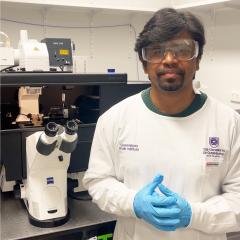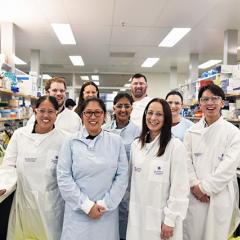Associate Professor Mike Piper has been awarded a prestigious international 2015 Innovator Award from the Hydrocephalus Association in the USA.
The US$30,000 award was one of only seven presented globally and Associate Professor Piper was the first Australian researcher to receive an award.
As well as actively raising awareness about the disease and supporting patient care, the Association also raises money to fund research into the causes and clinical treatment of hydrocephalus (water on the brain).
The annual Innovator Awards provide seed funding for bold and innovative research with the potential to transform the field of hydrocephalus through the understanding of disease mechanisms and the development of novel therapies.
Associate Professor Piper said his Innovator Award project would focus on trying to understand at least one of the causes underlying the formation of water on the brain.
“There are a number of different ways hydrocephalus can occur,” he said.
“One way is by obstructions which block the flow of cerebrospinal fluid and cause a build up from the front of the brain to the back.
“Another way is through communicating hydrocephalus, where the cells that line the ventricles of the brain malfunction and become unable to regulate the flow of cerebrospinal fluid.
“Our research is focussed on understanding potential causes of communicating hydrocephalus.
“Specifically, we are trying to understand how these specialised cells perform their function and what the critical mechanisms are for their normal development within the brain.
“By understanding this we can then take these findings forward and understand what happens to these cells in the context of hydrocephalus as well.
“Ultimately, investigating the basic biology of this system will potentially enable researchers to formulate rational strategies to treat this disorder, which has significant effects on both the patients, and their families.”
Full details of Associate Professor Piper’s research proposal, Analysis of the role of NFIX in the development of hydrocephalus, can be found on the Hydrocephalus Association website.



